Your Divine Self vs. Identity Politics: Navigating Modern Spiritual Activism
Balancing Activism and Spirituality: Navigating the Complexities of Identity Politics and the True Divine Self

In recent years, identity politics has become a popular and influential approach to social and political activism. Proponents argue that recognizing and addressing systemic inequalities based on factors such as race, gender, sexuality, and class is essential to achieving justice and equality. However, some have criticized identity politics as divisive, limiting, and ultimately reinforcing existing power structures.
On the other hand, the concept of the True Divine Self suggests that there is a deeper essence or spirit that connects all beings, transcending superficial differences such as race, gender, or sexuality. This approach emphasizes the interconnectedness of all things and encourages compassion, empathy, and self-awareness. While this concept may be rooted in spiritual or religious traditions, it can also be seen as a philosophical or psychological framework for understanding our place in the world.
The dichotomy between identity politics and the True Divine Self is not necessarily an either-or proposition, and there are many people who may see value in both approaches. However, the contrast between these two perspectives highlights the tension between recognizing and addressing social inequalities on the one hand and seeking a deeper, more holistic understanding of ourselves and our relationships with others on the other.
One of the main criticisms of identity politics is that it can lead to a narrow focus on individual identities that can be divisive and limit our understanding of ourselves and others. When we define ourselves primarily by our group membership, we may be encouraged to view those outside of our group as inherently different or even inferior. This can lead to a lack of empathy and understanding between groups, as well as reinforce existing power structures that perpetuate inequality.
On the other hand, the concept of the True Divine Self encourages a more expansive and inclusive approach to social and political activism that is rooted in a deeper understanding of our shared humanity. When we recognize the interconnectedness of all beings, we are more likely to act with compassion, empathy, and self-awareness. This approach can help to break down barriers between groups and promote a more just and equitable society.
At its core, the True Divine Self is often understood as a fundamental essence or spirit that is shared by all beings and that transcends superficial differences such as race, gender, or religion. This concept can provide a framework for understanding our interconnectedness with all things and for promoting compassion, empathy, and self-awareness.
While the True Divine Self may supersede individual religions and spiritual traditions, it is important to recognize that different traditions may offer unique perspectives on this concept and that not all perspectives may be compatible with each other or with other belief systems. Additionally, the concept of the True Divine Self may not resonate with everyone (Satanists, for example), and it is up to each individual to determine their own beliefs and values.
The True Divine Self can offer a valuable perspective on the tension between identity politics and spirituality and may provide a framework for balancing individual identities with a deeper understanding of our shared humanity. By recognizing the universality of this concept, we may be able to approach social and political activism with greater compassion, empathy, and self-awareness, and work towards a more just and equitable society.
Ultimately, the dichotomy between identity politics and the True Divine Self highlights the tension between recognizing and addressing social inequalities and seeking a deeper, more holistic understanding of ourselves and our relationships with others. While there is no easy answer to this tension (apart from educating everyone about The True Divine Self), it is important for activists to reflect on their values and goals and to strive for a balanced approach that acknowledges both the importance of individual identities and the interconnectedness of all beings. By doing so, we may be able to create a more just and equitable society that is grounded in a deeper understanding of our shared humanity and shared divinity.
Here are my Top 10 Action Points For Modern Day Spiritual Activism:
- Educate Yourself: Commit to learning more about both identity politics and the concept of the True Divine Self. Seek out books, articles, and discussions that explore these topics from multiple perspectives to broaden your understanding.
- Reflect on Personal Identity: Take time to reflect on how your personal identities (race, gender, class, etc.) shape your experiences and viewpoints. Consider keeping a journal to explore these reflections deeper.
- Engage in Dialogue: Participate in or initiate conversations with people who have different experiences and viewpoints. Approach these discussions with an open mind and a willingness to listen and learn from others.
- Promote Empathy and Understanding: Practice empathy by putting yourself in others’ shoes, striving to understand their experiences and perspectives. Use this empathy to foster a deeper connection and reduce division.
- Cultivate Self-Awareness: Develop a practice of self-awareness through meditation, reflective writing, or other spiritual practices that help you connect with your True Divine Self.
- Participate in Community Activities: Get involved in community activities that bridge different identity groups. Look for initiatives that promote inclusivity, understanding, and cooperation.
- Advocate for Inclusive Policies: Support or advocate for policies that acknowledge and address systemic inequalities while also promoting the recognition of our shared humanity.
- Educate Others: Share your insights on the balance between identity politics and the True Divine Self with your community or through social media. Education can be a powerful tool for change.
- Explore Spiritual or Philosophical Frameworks: If you’re inclined, explore various spiritual or philosophical frameworks that reinforce the interconnectedness of all beings. This might include participating in interfaith dialogues or spiritual gatherings.
- Reflect on Action: Regularly assess the impact of your actions on promoting justice, equality, and interconnectedness. Adjust your strategies as needed to be more effective in your activism.
In summary, navigating the complexities of identity politics alongside the profound concept of the True Divine Self requires a balanced approach. By embracing both the recognition of unique individual experiences and our underlying spiritual interconnectedness, we can foster a more empathetic, just, and unified society. These action points are steps toward understanding and bridging differences, promoting widespread empathy, and enhancing our collective well-being.

